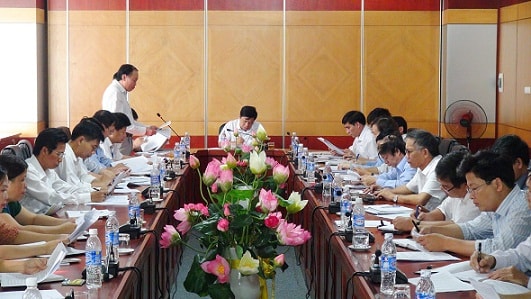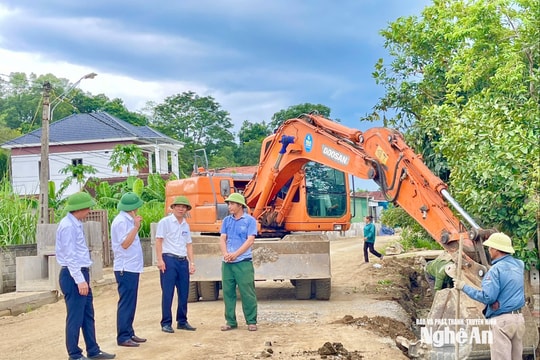Tax sector contributes to attracting investment from major partners
(Baonghean)- The General Department of Taxation has taken the lead in promoting negotiations on double taxation avoidance agreements with countries and territories to create a basic legal foundation on taxes for bilateral investment and trade activities.
Director General of the General Department of Taxation Bui Van Nam said that these can be considered essential steps, creating conditions to promote and develop Vietnam's economic integration process.
 |
| Nghe An Tax Department meets to discuss solutions to effectively exploit revenue sources |
* Comrade Bui Van Nam, what bilateral and multilateral agreements has the tax sector reached to help deepen international integration?
* General Director Bui Van Nam: Also since the 1990s, with the first phase of tax system reform, along with the cooperation of international organizations and some important partners (IMF, Sweden, etc.), the tax policy system and tax management mechanism have been gradually improved. This improvement is consistent with the multi-sector economic mechanism and gradual opening, ensuring compliance with the basic principles of international practice, as well as with the conditions and development level of Vietnam, while ensuring budget collection requirements. Since 1992, Vietnam has signed 71 Agreements and concluded negotiations on 10 Agreements, laying an important legal foundation and making a practical contribution to the increasingly deep and wide integration process of the Vietnamese economy in the past as well as in the future.
In addition, during the process of Vietnam's multilateral economic integration with the region (such as ASEAN, ASEAN+, EU, APEC, EU... and WTO), especially the first steps when joining ASEAN and AFTA from 1995 until joining the WTO in 2007, the tax system has been reviewed and gradually amended to comply with Vietnam's integration commitments. This is particularly significant, especially for the provisions on national treatment and tax incentives that may lead to violations of commitments on subsidies for exports or specific sectors and fields. Therefore, by 2005, tax laws were amended, eliminating elements that were not yet in accordance with WTO principles, completing a basic and relatively comprehensive tax policy system in accordance with Vietnam's WTO commitments.
Along with the process of perfecting the tax policy system, tax administrative management methods have also been improved. We have gradually applied computerization to improve the efficiency and effectiveness of tax law enforcement. At the same time, we have met the increasingly high requirements for the tax system to meet the macro management requirements of the Ministry of Finance in particular and of the Government, the Party and the State in general.
With the steps in this direction, the Law on Tax Administration was issued in 2006 and took effect from July 1, 2007, marking an important step forward, marking a turning point in improving the quality of implementing the Strategy for reform and modernization of the tax system in phase 2. Along with introducing a management method based on the self-declaration and self-payment mechanism of taxpayers, the Law on Tax Administration has synchronously institutionalized tax management stages in a clear, transparent and increasingly consistent manner with international practices and standards; meeting the management requirements for the increasing number of taxpayers, especially the explosion of domestic enterprises and foreign investment after Vietnam completed its commitments to the ASEAN AFTA free trade area in 2006 and joined the WTO in 2007.
 |
| One-stop transaction at Nghe An Tax Department |
*In that process, we will still have to face the challenges of economic integration for the tax system in the coming time, right?
* General Director Bui Van Nam: The tax sector is making efforts to focus on reforming towards increasing transparency and simplifying tax administrative procedures to facilitate businesses and taxpayers, striving to reach the tax management level of advanced countries in the ASEAN region. In addition, the continuous expansion of the network of tax treaties, with the number of over 40 treaties before 2007, up to now reaching 81 treaties that have been or are waiting to be signed, poses a great challenge for the tax sector in continuously improving the quality and efficiency of tax management in general and international tax management in particular.
Obviously, along with the increasingly deep and wide economic integration process, business, investment and trade activities between Vietnam and other economies are increasingly enhanced in scope and level. This inevitably leads to increasingly complex, diverse and frequently fluctuating cross-border economic activities. That is a big challenge for the tax system and tax administration in ensuring both the consistency and stability of policies and the effectiveness and efficiency of tax administration; especially for cross-border transactions, non-residents and multinational companies.
*What effective solutions will we have, comrade?
* General Director Bui Van Nam:In the field of international integration of the tax sector, there are a number of requirements that need to be resolved in order to perfect appropriate tax policy and management tools. Firstly, it is necessary to promote research to gradually prepare for enhanced cooperation with tax authorities of other countries to join the Convention on Mutual Administrative Assistance on Tax Matters. Secondly, it is necessary to gradually establish and perfect the database system to improve the efficiency of information exchange under the Tax Agreement, and move towards researching and participating in automatic information exchange agreements.
Third, it is to consolidate and improve policies and management measures for cross-border related transactions, for non-resident entities and multinational companies operating globally. Obviously, we need to build and strengthen effective control measures for large cross-border transactions to prevent tax evasion/avoidance. In addition, there are other solutions such as continuing to improve policies and mechanisms for transfer pricing management, while actively preparing for the implementation of bilateral agreement procedures under the mechanism of the Tax Agreement. Proactively research and actively participate in international tax forums and professional exchange activities on tax management in the region and the world.
The issue of training human resources with high knowledge and expertise to be able to participate in international tax policy research and management also requires priority attention. This is essential for the tax sector as well as related units in the Ministry to respond to the increasing challenges of international tax issues and cross-border transactions of multinational companies that are constantly changing due to the objective context of the business environment as well as the subjective aim of minimizing tax obligations, especially in developing countries.
*Thank you very much, comrade.
Red River (implementation)



.png)




